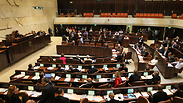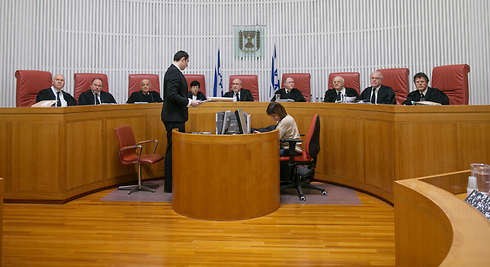
Israel's non-representative new government
Op-ed: The voices of the Knesset members should be the voice of the majority – not of the left, or of the right, but of a majority that represents the Zionist and national interest.
It won't offer that "expression of the will of the people" that opponents of a national unity government have been going on about endlessly for the past month. A narrow government is not a democracy. It's a "minocracy," in which the minority imposes its will on the majority.
The majority, including most Likud voters too, is in favor of sharing the burden. The majority, including most Likud voters too, oppose the Nahari Law, which required local authorities to fund non-state, ultra-Orthodox schools that don't teach core curriculum subjects, thereby encouraging Haredization and separatism at the taxpayers' expense.
The majority, including most Likud voters too, doesn't want the government of Israel to promote the nightmare vision of "one large state." But this is what is about to come crashing down on the heads of the majority, which is opposed to the rule of the minority.
It's not just the people. It's the Knesset too. There's no parliamentary majority for a significant portion of the government guidelines that are likely to be adopted. After all, most of the Kulanu party's Knesset members are freaking out these days.
Yes, the world of politics requires compromises. But we're not dealing here with compromises. We're dealing with capitulation. With respect to two fundamental issues, the Nationality Law and laws related to the judiciary, they demanded and received a veto right. But where do they stand when it comes to the issue of sharing the burden? Where do they stand when it comes to the Nahari Law?
After all, your voices, distinguished Knesset members, can and should be the voice of the majority – not of the left, or of the right, but of a majority that represents the Zionist and national interest. This is your moment of truth. But when it comes to these issues, you have disappeared and gone silent. You won't be the only ones to pay the price. The entire country will pay. Please God, we'll be proven wrong.
A necessary distinction
Left-wing groups turned to the High Court of Justice with a demand to revoke the Boycott Law, and the High Court rejected their petition. Ever since, leftists have been moaning about the violation of freedom of expression, and the devout among them are already calling for a boycott in an effort to make the law look ridiculous. They know they aren't going to be arrested by undercover agents. But they have another opportunity to say that Israel is a dark country. They won't let it slide.
That said, there is a problem with the law. One can certainly justify a law that denies benefits to BDS supporters. After all, we're talking about a campaign that denies the very existence of the State of Israel. So they can fight for its destruction and Israel can't respond?
It's harder, however, to justify expanding the law to include those who support a boycott of the territories only. Because one doesn't have to agree with the latter to understand that there is a difference between those who oppose the existence of Israel and those who oppose the settlement enterprise.
There are two political streams that make no distinction between an outpost in the West Bank and a city in Israel – the extreme right and the extreme left, the supporters of the law and the supporters of the BDS campaign. The High Court tried in fact to make this distinction; but the petitioners made it clear that as far as they are concerned, the law in its entirety must go.
The problem lies not only with the supporters of the boycott, but with the supporters of the law too. Why the hell did the right-wing in the Knesset insist on aligning itself with the logic of the Israel haters of all people?
Taking the fight to FIFA
Palestine Football Association President Jibril Rajoub is pressing ahead with his campaign to get Israel suspended from FIFA, world soccer's governing body. He is demanding, for example, "unequivocal action on the part of Israel against manifestations of racism." A just demand. The racist chants against Arabs in certain soccer stadiums are a disgrace.
The thing is that Rajoub's language is no different to the language used by La Familia, the racist wing of the Beitar Jerusalem fans. Rajoub, in the past, also once said: "If we had nuclear weapons, we'd use them against Israel."
Considering the fact that he calls Jews "the sons of Satan" and consistently voices support for terrorism, it's safe to assume he would carry out his declared wishes if he only had the ability to do so.
Rajoub has been invited to address respectable forums, like the Israeli President Conference under the auspices of Shimon Peres. He was invited in the past to speak at the Meretz convention, where he was labeled a man of peace. The flattery was of no use. The so-called man of peace labels his embracers "the sons of Satan." That's not very nice.
An Israel NGO, Mattot Arim, has filed a counter-complaint with FIFA, demanding that Rajoub be expelled from the organization. FIFA will debate both Rajoub's demand and the counter-demand at the end of May. It should be interesting.
An intellectual challenge
Caroline Glick is an excellent publicist. Her book, The Israel Solution, calls for the annexation of the territories. An interesting read for the most part, the book largely presents a critical historical point of view.
But the just arguments don't lead to the right conclusion. Glick adopts the one-state solution that many among the extreme left have been touting and nurturing for years. The intentions are different. The outcome is the same.
How exactly does one create a harmonious state with populations so hostile towards one another? Based on the fact that very few of Israel's Arab citizens participate in acts of terror against the state, Glick attempts to conclude that the Arabs in the territories (she leaves Gaza out) will follow suit in the wake of the annexation. But her conclusion is deficient. What failed to work in Yugoslavia and Czechoslovakia is not going to work in a Greater Israel.
This is the Middle East after all. Shi'ites, Sunnis, Kurds and Alawites are slaughtering one another. And she expects there to be harmony here with the Jews?
There is a reasonable chance for coexistence in a country in which there is a distinct Jewish majority. The smaller this majority, the greater the hostility. And even if the new demographers are right, and there are fewer Palestinians than the old demographers claim, the problem still remains.
Nevertheless, the book is a fascinating, interesting and enriching one, many parts of which pose an intellectual challenge, particularly to those who are opposed to Glick's opinions and conclusions.













